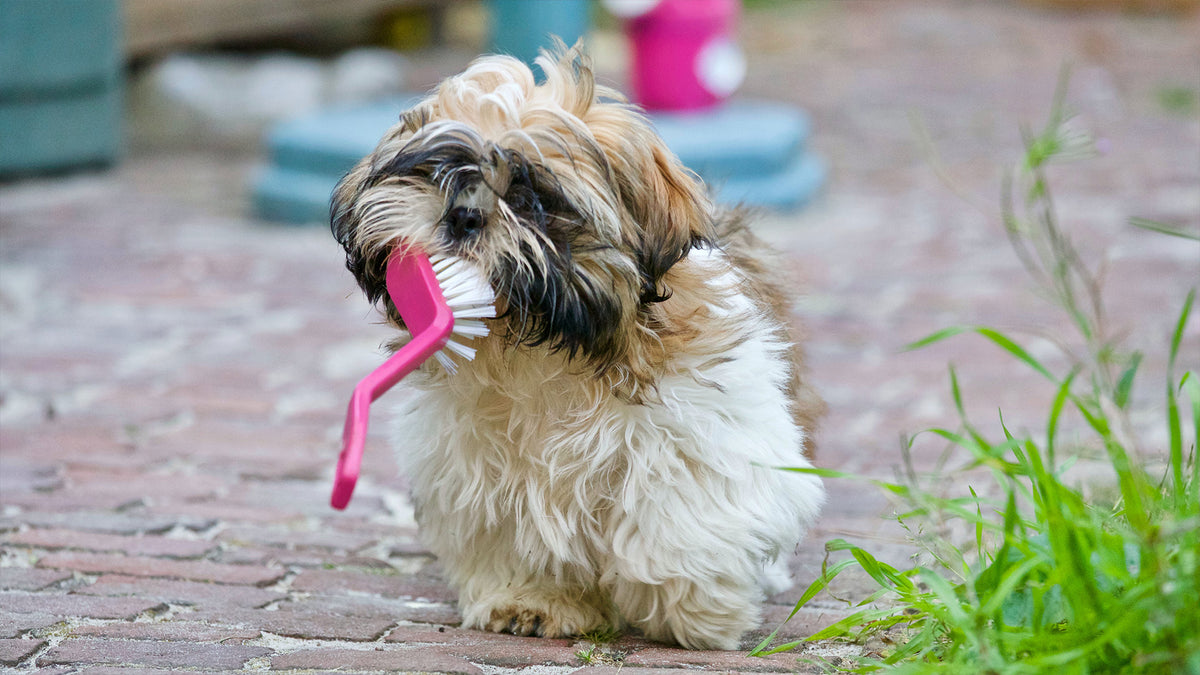
Have you brushed your pet's teeth recently? Caring for your pet's dental needs is an essential part of helping them live a long and happy life. This February, Voyager is celebrating National Pet Dental Health Month by sharing what you need to know about taking care of your pet's teeth. We hope this article will provide some insight into your pet's dental health needs and help you kickstart some healthy dental habits.

☺ Why Your Pet's Dental Health Matters
According to the American Veterinary Medical Association, most adult cats and dogs have some degree of dental disease. Dental disease is also known as periodontal disease and is the most common health problem veterinarians see in pets. This condition not only causes bad breath it can also have significant impacts on your pet's overall health.
When plaque and tartar build up on your pet's teeth, it becomes a breeding ground for harmful bacteria. The bacteria in your pet's mouth can spread below their gum line, causing gum inflammation and infection. When the infection spreads, the bone surrounding your pet's teeth can be compromised, causing your pet's teeth to become loose and fall out. Dental disease is often painful for your pet and can affect their ability to eat. In addition to the discomfort, the bacteria in your pet's mouth can also enter their blood system spreading the infection to your pet's essential organs.

☺ Routine Brushing and At-Home Dental Care
The first step in improving your pet's dental health is improving your pet's at-home care. Frequently brushing your pet's teeth will help remove plaque and prevent tartar build-up. This will decrease your pet's risk of dental disease and improve their overall wellbeing.
While daily brushing is ideal, this can be challenging for many pet owners. Try to brush your pet's teeth at least a few times a week. As your pet gets comfortable with their new routine, brushing may become easier and less of a hassle. It is also helpful to start brushing your pet's teeth at an early age. This will help them get accustomed to the strange sensation and keep their mouth healthy for years to come.
When brushing your pet's teeth, it is critical to use pet-friendly toothpaste. Human toothpaste commonly contains xylitol, an extremely dangerous ingredient for pets. Pet toothpaste is not only safe, but it also comes in flavors that can make brushing a more enjoyable experience for your furry friend.
In addition to brushing, dental chews can also be useful for improving your pet's dental health. Dental chews help remove plaque and provide a tasty treat for your furry friend. Dental chews are available for both dogs and cats and come in various sizes to meet your pet's specific needs.
If you are unsure which dental products are best for your pet, consider reaching out to your veterinarian. They can provide recommendations based on your pet's unique needs. However, checking the product label can also be extremely helpful. Some products will contain a Veterinary Oral Health Council seal of approval. This means the product has undergone rigorous testing by veterinary professionals to ensure the product is safe and effective for your pet.

☺ The Importance of Professional Dental Cleanings
While at-home care is critical, your pet will also need to see your veterinarian for more advanced dental care. Veterinarians provide a wide variety of dental services, including professional dental cleanings.
Professional dental cleanings are performed while your pet is under anesthesia. This allows your vet to do a thorough evaluation of your pet's mouth and provide a deep cleaning. Ultrasonic scalers are often used to remove heavy tartar build-up and reach the nooks and crannies a toothbrush cannot. Your veterinarian may also use dental x-rays to evaluate your pet's oral health and detect early signs of dental disease.
Most pets require annual dental cleanings. However, the frequency of your pet's cleanings may vary based on their overall dental health. At your annual wellness exam, your veterinarian can examine your pet's mouth and recommend when to schedule their next cleaning. However, if your pet's breath suddenly worsens or they are showing signs of dental pain, you should have your pet evaluated as soon as possible.

Sources:
• www.vohc.org/index.html
• www.avma.org/resources-tools/pet-owners/petcare/pet-dental-care

